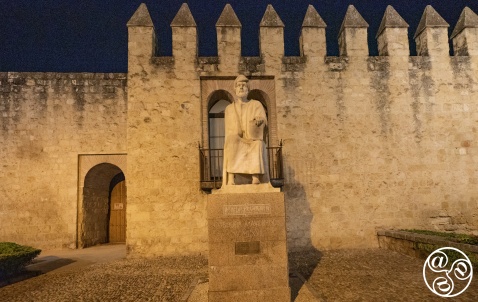
The Moorish philosopher Averroes, was born in Cordoba. |
|
Averroes philosopher of Cordoba
By Wijdan al shommari
I have always been especially fond of the great Moorish philosopher Averroes. He was born in Cordoba, then the capital of al-Andalus, in 1126. His real Arabic name was Ibn Rushd Al-Cortobi, or "of Cordoba", and we can admire his statue today, just outside the medieval walls. He is wearing a turban and elegant beard and beautiful pointed slippers, and he seems to be getting up from his seat to welcome a visitor, perhaps to tell him the tale of the sadly forgotten love affair between the Arab peoples and the noble art of philosophy.
He has been known to Westerners as Averroes since the Middle Ages (ave = ibn, rroes = rushd), and although I am an Arab I prefer to call him by his Latin name because his work has always been better understood by Europeans than by his countrymen. He was truly a universal man, and is most famous for having helped Europeans to discover the lost philosophy of the Ancient Greeks, which led to the classical revival known as the Renaissance.
Averroes came from a wealthy and important Cordoban family. Like his father, he was a judge, or cadí, and eventually rose to the position of supreme magistrate of the city. Averroes also became a close friend of the Caliph al-Mansur. His high standing with the Caliph gave him many privileges, but it created much envy and later brought about his ruin.
Averroes was bitterly attacked for his ideas and writings, which the Muslim clerics saw as a threat to their orthodox vision of the universe. But Averroes was not only rejected by the Islamic fanatics. The Christian Church condemned him for spreading heretical beliefs, as a result of which his supporters were persecuted and his books were burned in public. He was also a great admirer of the Persian philosopher Avicenna (in Arabic, Ibn Sina) who, as a "sceptic", was widely read by European thinkers and reviled by the Mullahs.
The Caliph of al-Andalus, like many other emirs and sultans of the Arab world, held a court of learning in his palace where scientists, mathematicians, translators, poets, philosophers and astrologers could meet and discuss their ideas and discoveries. It was al-Mansur who brought the works of Aristotle and Plato from Damascus and Baghdad and encouraged Averroes to translate them. He added his own interpretations of the Greek's ideas and called the work "Comments on the works of Aristotle", which eventually earned him the epithet of "The Great Commentator". This book became a real Bible for European philosophers, until the works of Aristotle could be translated directly from Greek into Latin.
The works of Averroes and Avicenna were attacked by an Islamic sophist theologian, Al-Ghazali, in his book "The Incoherence of the Philosophers", in which he accused philosophers of being dishonest, heretical and presumptuous. Averroes set out to defend himself against the very serious accusation of heresy, in a book which he sarcastically entitled "The Incoherence of the Incoherence".
In his retort, Averroes claimed that philosophy is the most sophisticated form of religion. He argued that philosophy goes hand in hand with faith. It does not deny divine revelation at all, he said, but, rather, confirms it.
According to Averroes, metaphysical truth reveals itself in two forms, philosophy which is only for the elite, and religion which is for the uneducated masses. However, he said, the origin of life could not be known to man, and no mortal can either confirm or deny the existence of God. Averroes did not reject religion but, rather, saw it as the best way of life for the people. However, he did reject all theories of creation and insisted that the world has no beginning and no end, but that behind it all is God. He also believed that the human soul is part of the undivided universal self.
"The Incoherence of the Incoherence" incensed the Mullahs of Cordoba, who felt that Averroes' book was "dangerous", and they used it to blackmail his protector the Caliph, accusing him of dabbling in heresy. In spite of his enormous power and his admiration for Averroes, the leader was forced to expel the philosopher from Spain. Averroes sought asylum in Marrakech, and stayed there until his death in 1198. He was so disappointed in his friend the Caliph that when permission was given for him to return to Cordoba, towards the end of his life, he turned it down. In the Arab world, Averroes is still paying for his outspoken behaviour. Although his name is upheld as a glory of Arab intellectual culture, his teachings - shockingly - are not available to the general public. Last summer when I visited my grandparents' home in Damascus, I went to several bookshops to look for a copy in Arabic of "The Incoherency of the Incoherency", only to be told that his books are banned in Syria.
I went away amazed. How could Averroes, the philosopher of Cordoba, still be a threat to modern society, after eight long centuries?